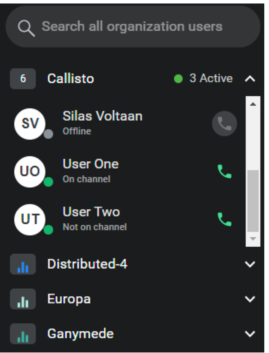Managing People
ICE supports the following methods for managing user accounts (People).
By default, ICE supports administrator management of user accounts (People) via the ICE Desktop application.
If you are using LDAP, you must manage user accounts on LDAP. See Configuring LDAP.
If you are using Entra ID, then you must manage user accounts on Entra. See Configuring Entra ID.
ICE supports the bulk import of local user accounts only. If you are managing user accounts locally, then you can create a bulk import .CSV file. See Bulk Importing People.
Local Management
This section provides instructions for managing local user accounts on an ICE Server via operation of the interfaces located in the Settings > People page on the People tab.


 | In ICE Desktop, the People tab is populated by a list of channel names. Expanding a channel name reveals a list of all the People assigned to the channel. Their current status is displayed under their name. In the screenshot at left, the Callisto channel has been expanded and three of its users are visible. The status of each user is displayed as Offline, On channel, or Not on channel. There are 6 People assigned to the Callisto channel, hence a scrollbar has appeared to move through them. 'Not on channel' indicates User Two will not receive transmissions or texts on this channel, but they are still logged in to ICE and can be called. Only one channel may be expanded at a time. Expanding one channel collapses the current channel. To find a specific user, enter the name in the search box at the top. If the user exists within your organization (your ICE Server database), then they will appear in the search results. Private calls may be initiated using the Call (phone) icon when available. |
Understanding the Groups Tab


People/Channel Groups are collections of people and/or channels created for easy assignment and removal. People/Channel Groups may contain channels only, users only, or any mix of the two. For instructions on creating and using People/Channel Groups see Managing People/Channel Groups.